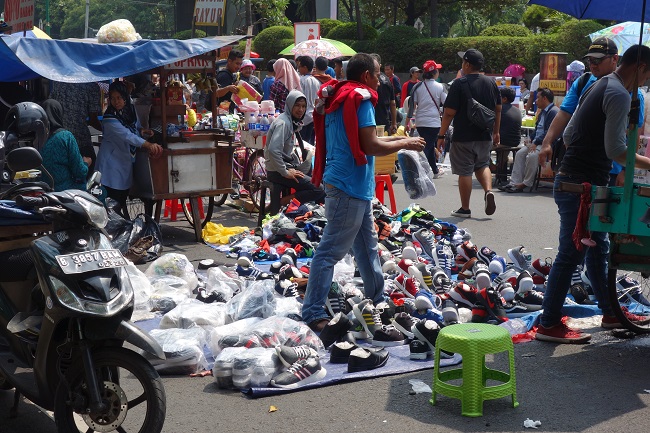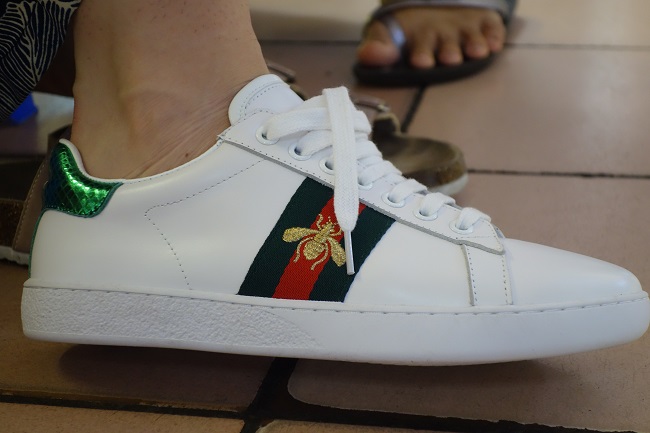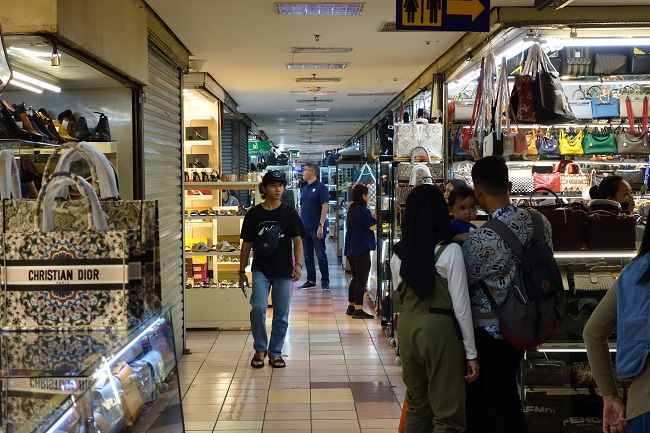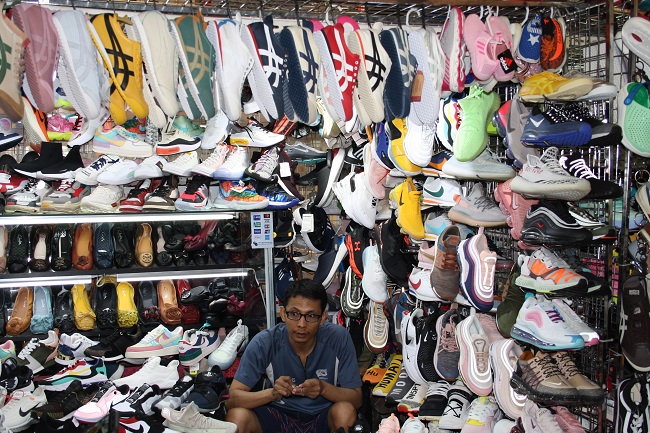Indonesian youth are buying more fake fashion despite some awareness of its harmful impacts
This article is part of a mini-series featuring the work of journalism students from Queensland University of Technology (QUT) who travelled to Indonesia in November 2019 as part of the Australian government's New Colombo Plan Mobility scheme
Alice Sinclair, Daniele Antonaglia and Max Eagles
‘The original price is Rp16 million,’ says the young Indonesian man as he points to a new season Dior bag on the glass counter of his cluttered stall, located in a multi-levelled, indoor market hotspot for counterfeit goods in Jakarta.
‘Here you can buy it for a fraction of that price, only Rp1.4 million. They are mirror quality, meaning no one will be able to tell the difference.’
For this vendor and many like him, business is booming. Sales continue to increase across his five stores and online marketplace as more and more young Indonesians want the designer look, he tells us.
The International Trademark Association’s recent report reveals Indonesian youth are purchasing more fake fashion from counterfeit marketplaces, despite possessing a basic understanding of the harmful impacts of the industry. Simultaneously, interest in sustainable, fair fashion manufactured in a regulated environment is growing, with those surveyed hoping to eventually leave counterfeits behind.
According to the ITA 2019 report, 87 percent of Gen Z-ers in Indonesia, born between 1995 and 2010, purchased counterfeit products, namely apparel, shoes and accessories, in the past year. While 90 percent of those surveyed reported an appreciation for intellectual property rights, when it comes to deciding whether to purchase fakes, income considerations continually outstrip moral concerns.

The economic impact of the counterfeit goods market is also significant, with a 2014 study by the Indonesia Anti-Counterfeiting Society estimating that it causes a loss of up to Rp65.1 trillion for the national economy. Impacts of the unregulated industry are wide-ranging, from lost sales for intellectual property infringement to environmental damage.
Luxury tastes
On average, Indonesians earn about US$183 or Rp2.5 million per month, while a single pair of genuine Gucci sneakers can cost more than three times that. ‘Teenagers in my country always buy fake goods because the price is very different and they’re also very easy to find,' 22-year-old Jakarta resident, Shasa, tells us.
‘My friends are mainly interested in Gucci, Hermes and Balenciaga, all brands which they could definitely not afford otherwise.’
These big international designers are among the largest victims of the counterfeit fashion market, however, the practical solutions for them are limited. There are avenues for big brands to enforce their intellectual property rights, but they can be costly, slow and inconsistent from region to region, explains intellectual property lawyer and founder of the Indonesian Anti-Counterfeiting Society (MIAP) Justisiari Kusumah.
Further, enforcement of intellectual property law is complicated because complaints must be initiated by the brands themselves.
‘Authorities can only take action on the basis of complaints from trademark holders, they cannot act without a complaint.’ Brands are often dissuaded from pursuing those who infringe trademarks because the process can be lengthy and complex.
‘Intellectual property court proceedings will usually take at minimum four years to resolve. We make sure clients are aware of the difficulties of pursuing this avenue.

‘MIAP, while not an enforcement body against counterfeits, aims to combat counterfeiting, through raising public awareness and consumer protection by promoting education on these issues', said Kusumah.
Sustainable and ethical fashion
The push to inform the public is paying off, with the recent survey showing that 72 percent of participants expect to buy fewer counterfeit products in the future.
University student Octaviani, 20, is part of a growing number of young Indonesians taking an active stance against the counterfeit industry in favour of ethical and sustainable fashion.
‘My friends and I do not buy fake goods but I know many students do. We like to buy Indonesian brands when we can afford them. The quality is much better and we don’t want to support an illegal industry.’

Counterfeit goods are increasingly unappealing to consumers concerned with the ethical and sustainable nature of producing fashion. ‘Slow fashion’, a higher quality, ethical and sustainable alternative to fast fashion, is booming in Bali. Brands like Rimmba and Indosole produce their goods using recycled materials. Sunglasses producer Bambusee partners with local charities to improve eye health access for disadvantaged Indonesians.
The material quality of both counterfeit and genuine fashion can be easily measured in person. For example, when turning a shoe over, a buyer can observe the materials used and the quality of construction. Consumers cannot tell with similar ease whether the shoe was produced ethically or sustainably.
‘There are no easy answers to what makes an ethical garment,’ says a sustainable fashion expert at Queensland University of Technology, Dr Alice Payne.
Genuine product manufacturers can publish production information, which naturally the counterfeit market producers do not. Genuine products can also use third-party accreditation, such as that by Fairtrade International, to help convince shoppers of a brand’s commitment to ethical fashion.
Businesses can operate transparently, publishing production costs, allowing would-be shoppers to understand where the money from their purchase ends up. They can release details on the working conditions at the company, and publish the wages paid to workers.
Even when enforcement works effectively and counterfeit goods are confiscated, the destruction of fakes poses sustainability concerns. Seized goods are often incinerated, releasing harmful greenhouse gas emissions. Dumping the shipments in landfill is even worse, considering the detriment to the environment due to the waste and the emissions that are released over time.

‘It would be better to prevent counterfeiting in the first place, but this is also contrary to how fashion works as a cultural industry – fashion thrives on imitation and the diffusion of trends,’ says Dr Payne.
While the trademark infringement regime remains complaints-based, responding to counterfeiting is solely reactive. Without a proactive infringement body, progress is unlikely to be made in curbing the counterfeit market.
For vendors trading in this relaxed regulatory environment, business is thriving.
'Business is doing very well. We run five other shops just like this nearby and our online store is highly trafficked. As goods are mirror quality and can be delivered within 24 hours via Gojek, it’s easy to see why young Indonesians keep coming back.'
Daniele Antonaglia (daniele.antonaglia@connect.qut.edu.au), Max Eagles (max.eagles@connect.qut.edu.au) and Alice Sinclair (alice.sinclair@connect.qut.edu.au) are journalism students at the Queensland University of Technology who travelled to Indonesia with the support of the Australian Government’s New Colombo Plan Mobility Scheme.












